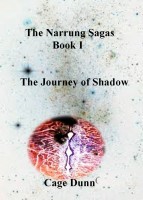Cage Dunn's Blog, page 86
October 18, 2016
Not a Game

Do not consider failure! Cat does not know Failure!
A Serious business, in fact. What is? Being a writer, of course. I set myself up a schedule to write a specific number of words per day on the major project (ignoring the numbers for research, notes, free-writing, scribbles, etc.) so I could focus on the main (the proper) job. It happened when I found the arena where the character arc wasn’t doing what it could be doing. Required some play-time to get the right feel (and some deleting). And of course, I got behind. Didn’t keep up the output. Bound to happen.
And what did I do? I said, I’ll be waiting until tomorrow to pick up those few lost words.
Whoa! Stop, go back. What was that? Keep adding the shortfall to the next day, or the next week, or the weekend – always playing catch-up? I don’t think so. Unless it’s a deliberate ploy to set up for failure. Because that’s what would happen.
I have to accept that there will be days (another song verse!) like that, where the count for the work isn’t what the schedule insists; there will be days when there’s more research and freewriting and scribbles than the main work, and how should I deal with it?
Not by adding the lost few words to the next days expectation of output, that’s for sure. It wouldn’t take long at all to feel so swamped and overwhelmed that the only choice would be to give it all up and go [insert depressing activity, or lack of, here].
I will start each day with the expectation of output as a fresh and blank source of energy. No adding in the missing bits from yesterday or last week, no building a mountain of failure and disappointment, no feeling of dread when I approach because I’m so far behind and . . .
You know how it goes – we pile it all on and expect we can deal with it all eventually. We can’t. We never could. There are physical limits, there are emotional and spiritual limits, there are the limits of reasonableness. I mean, how can we expect to have a mind free enough to be creative when we overload it with other ‘stuff’ that doesn’t contribute to the dream?
We all know the answer to that, but do we stop it? ‘It’ being the things that get in the way, our own expectations and demands, the family, friends, and community expectations, the normal life business.
Most of them we don’t stop, wouldn’t want to, but we can stop the complication of expecting too much of ourselves, of layering on the guilt for not keeping up with . . . whatever benchmark we think we should set for ourselves.
So I start each working day with the fresh count, no add ins from the past, this is today, the present, and I go into the present (now fully warmed up by the exercise in writing words on a medium) fully armed with only one output expectation! Story!
Yeeeeehaa!!!


October 17, 2016
An Urgent Need
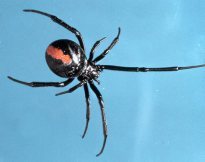
red back!
Picture from: http://australianmuseum.net.au/redback-spider
Story: Copyright Cage Dunn 2016 (excerpt from A Blood List)
Night fell quickly, the darkness more black than in the city. Van expected quiet, silence. It wasn’t quiet. No silence. Noises invaded her space. Rustles from branches and leaves; movements through the brush. Screeches and screams shattered the night as possums, or cats, or something, decided to fight or frighten off its enemies. Van lay awake, trembled, as the world around her woke, and warred, and disputed territory and prey.
Noises came from downstairs: ripping, a crash from the kitchen area, thumps. She wasn’t going down there to find out what, if anything, was there. If she found nothing broken in the morning, she’d know her vivid dreams were getting the better of her. If anything was broken, she would know the wild critters disputed her claim to the space.
On the second night in her new home, after she rearranged all the contents to her satisfaction and disposed of the broken glasses – why didn’t that oaf just leave it to her to unpack? – she wanted to use the stove. No wood. She went out to get some wood. Too big to fit into the old wood-burner. An axe? Yes, she found an axe in the shed. Blunt, the first time it hit a piece of wood, it bounced off and flew through the air. Missed her leg by a hair, and the car by a layer of paint. Crap.
Something to sharpen it with? Hunted around in the half dark with a weak, yellow-lit lamp until she found the strop. Held the axe against the strap while one foot worked the foot pedal; so heavy she nearly dropped it. Finally, it was sharp enough. Back outside in the creeping darkness to chop some wood so she could cook, eat something hot.
The fingers with the painful splinters from carrying the wood were the fingers she burned on the heavy, cast iron stove-plate when she tried to move it off to put the pan on –and her good frypan would never be the same again. But food was not something to waste, so she ate what she cooked. Her stomach gave her hell for the whole night.
Van discovered the perils of the long-walk, long-drop dunny in the middle of a black night with just a small kero lamp for protection.
The piece of corrugated iron – crap – laid up against the tank stand to protect the new trees clattered as she tripped on it in the dark. Little black sticks, with one or two leaves, sitting like insects in their black plastic tube-pots. More hard work, more digging in soil that didn’t have much that wasn’t rock. She chose this. Quietness. This moment of calmness that only comes with being alone with herself.
As she stepped through the wonky toilet door, something slithered in the darkness. A scuttling noise. Flapping. Van froze, her stomach tightened. Maybe she didn’t really need to go at all. Her stomach rumbled. Yes, she did. A hook hung on the lintel over the door, and she hung the lamp up. The circle of yellow light wasn’t helpful, barely distinguishing the seat from the wall. But she had to. The stomach rumbled again. She had to. She stepped up and stood on the seat, squatted over the deep, black hole. A web glistened not very far down. Directly below where she would have sat . . .
A web? What else could happen? A red-back bites her on the bum, good theme for a song – oh, yes, that’s already been done – as a warning about this type of toilet! As quickly as she could, she finished what she had to do, and tiptoed along the tiny track, tried to be as quiet as possible on the return journey to the shed. She didn’t want to wake the night things.
The door creaked shut as she shoved it from inside. She washed her hands under the water barrel – now half empty; she would have to fill this every day. A loud bang vibrated the timber door. Her heart thumped against her chest as it ran a race against the decision of fight or flight. What was she afraid of? There was nothing here. There had been nothing here for years, nothing but animals, insects, emptiness. A deep growl, followed by another thump against the door. She shoved the water barrel against the door and jammed it there, sloshed water onto her cold feet; pushed all her weight against it.
A roar just outside the door. Hairs stood up on her arms, on her legs, her face. Instinct unfroze her feet and flew her up the stairs and under the doona cover.
She hid her head for a few seconds, listened to the noises, realised that just because she couldn’t see it, didn’t mean it couldn’t see her. She threw the cover off, sat hunched against the pillows. A tickle on her neck brought a scream to her lips as she leapt up, swiping furiously at her neck.
A feather. Just a feather. She looked up at the rafters. Two beady yellow-green circles reflected back at her. Was that an owl? An owl was roosting above her bed. Don’t owls go away during the night? Hunting or something? Would it shit on her bed? On her? That hole in the roof would be next on her list of things to fix.
Creaks on the stairs. Footsteps. Coming up the stairs. Van leapt off the bed, grabbed the stick at the top of the stairs – a walking stick; where had that come from? She stood there, stick high in the air, waited for whoever was there to come up the stairs.
Nothing happened. No one came up. Her heart started to slow, her breathing started to ease. Tap, tap. She leapt down the steps, cane raised, saw the bale twine wrapped around a bit of stick, swinging in the breeze under the steps. There was nothing else. Nothing. No one was here. She was alone. She sat in the divan chair upstairs with the doona wrapped around her, watched the top of the stairs until her eyes closed from sheer weight.
The next day, she went to markets at the closest village and bought a portable composting toilet for behind the tractor, towards the end of the shed, just for night use. The second-hand book stall provided the 1940s CWA cookbook for beginners, frayed yellow. It had a wood-stove on the cover. From the hardware, stock and station agent, she got a lantern, LED, with an adjustable light array. And she set up a dongle with the aerial so she could get some form of internet connection.
A lone koala watched her from his perch as she strung up the aerial. Do koala’s roar? She didn’t know. He was asleep, peaceful. His sleep time. Maybe she should make some noise, something loud, to keep him awake. Would he then move on to another territory and leave her alone? Probably not.
Animals! Would animals damage the wire? Could a koala move along them? She would have to make sure the tensioning was perfect to allow for heavy animals like koalas, opportunists like possums – would they chew the plastic off the dongle? Galah’s would. What else could damage it? She’d have to check it every day to start with – could she set up a motion activated camera to see what happened? If she got a few of those mini-cams, she could set one up outside the shed to see what the night monsters were. She was sure it was only animals, but . . .


October 15, 2016
It’s That Time
Sunday morning; time to get out the fresh bit of paper (blank screen) and get into all the little ideas and story germs that patter their way into my thoughts and moments during the last week.
This week was a little subdued; I wonder if that’s because I’ve been able to work head-down, bum-up on the Dragon Dream novel with such gusto – no stopping to research little things, or changes from the characters, or plot or arc stall points. In fact, it went so well this week, I finished the first draft. Not just the outline, the whole, complete, almost ready to move onto editing stage first draft completed. And I think that’s because the world stuff, the character stuff, the situation and problems and conflicts, were already there, in my head or in the notes or in the previous story. I won’t say it’s been easy – it’s still hard work and dedication and the 3p’s (patience, persistence, perseverance), but . . . I’m pleased.

So now I sit down to write out all the little idea seeds that popped up, either while I was trying to work, while I was lying awake at night (pretending to either sleep or meditate), while watching telly or reading stuff that wasn’t interesting, washing the dishes, doing laundry – anytime the brain isn’t active in the current project, in fact.
Write them down, give them some other words to build up the bed of words into a garden, let it sit until the season is right, and the time is right, and the moon shines full and highlights those words into the magic of a story.
The main idea this week came with just one word (often happens like that). The word: Inspection. Although the character (my things always start with a person) said ” ‘spection” like it was a special thing in his world, and like it was something to fear. The picture was from inside a building, and he’d just jammed as much furniture up against the openings as possible, pulled his companion down below the sight line of the gaps in the windows, and waited. Sure enough, barely seconds later, a face appears at one of the gaps. A voice: ‘sure I heard something – we gotta fill the quota this week, or the ‘spections start in our section.’
Interesting, isn’t it? No real story yet, but there’s the characters, the start of a plot, and the conflict of ‘them or us’.
of course, I can’t do anything about it right now except fill that blank page (usually it’s just a para or a scene or a page (or two)) at this stage, but I know it’s going to sit there and wait and while it’s waiting, the idea and form and structure will grow and flower and be ready to bear fruit – at the right time.


October 13, 2016
Attempts At Communication
The words I make, the sentences that make clumsy attempts at meaning, go out and hit the reader in their comms sphere. I try to make the words say what I want the reader to understand. But the person on the other end of my words has their own way of understanding the world, and it may be so completely different to the way I understand and communicate mine.
But I try. And I will keep trying. It is a necessary part of my life, because:
Silence is a Lie.
I keep saying that because to remain silent when you should speak out means – and I am not being subtle here – that you either condone the act/action, you are afraid/cowardly, the act/action has become normalised in your community, or you’ve done it yourself, so it’s not all bad (or, the worse of all, it’s none of your business).
These are all responses to save self, but don’t help to save your community, the people who live in your community, the future of your community.
I live in the city of Adelaide, in Australia (south of the tropics, way down there). These numbers are a few years old now, but there are 26,000 children on the At Risk Register. the adult population of Adelaide is (about) 1.2 million.
What do those numbers say to you? 26,000 CHILDREN at risk of harm or danger or self-harm or . . .
And what do we do? Well, after the last few years of trying to sort out the government agencies that ‘look after’ these issues (and trying to remove the entrenched pedophiles and other scum), they appoint a new ‘leader’ and start mouthing about the strategies to take them forward.
The issue remains: 26,000 children on the At Risk Register.
How many kids live on the streets?
How many kids live in desperate fear of their lives, or the lives of the siblings?
How many kids down drugs like lollies to find their escape?
How many people are willing to take on the role of fostering (yes, it’s hard work) to help ease not only the danger and fears of these children, but to give them the hope of a future that doesn’t involve drugs and crime?
How many people even see the problem?
***
This is the most serious issue in a community. How can we expect our children (all of them, even if they’re not on the register) to grow up to become contributing members of an inclusive society if we can’t demonstrate that to them while they are children?
Why can’t we demonstrate that?
Why can’t we remove the issue of rampant pedophilia and other forms of child abuse? Why is the problem so big that no one takes it seriously enough to get rid of them (we do not need these people be an included element of our society)?
I know there are people out there who care for children and are not abusive (or worse). They exist. I’ve met them, talked to them, shared some of the sorrows and joys of being a foster carer. Les Twentyman, I thank you for the words we shared so many years ago, the help you offered me and mine.
It’s hard work; trying to get someone to trust you, to earn that trust and affection; it’s heartbreaking to see how hardened and untrusting a young person can become in such a short time. It’s liberating to see when they take that first step on the path to normal dreams, normal choices (whether we like them or not), normal feelings.
Please help. Don’t leave them on the side of the road, don’t leave them to die or be murdered or raped or treated like [insert the worst thing imaginable here].
Please.
No pictures, raw words only.
***
It’s why I write for YA, to show them there is a choice, at some stage, and that there are people who can be trusted.


October 11, 2016
A Defined Strategy
 For the start of the new novel, something original, just for this series, I think! Let me see; should it be a word count minimum per day? Or maybe, a chapter (or scene) count per session? Or, just write ’til the juice runs out, or the dog stares at me with desperate eyes, or the stomach roars to disrupt?
For the start of the new novel, something original, just for this series, I think! Let me see; should it be a word count minimum per day? Or maybe, a chapter (or scene) count per session? Or, just write ’til the juice runs out, or the dog stares at me with desperate eyes, or the stomach roars to disrupt?
Usually, the process is simple: finish a project, let it sit, commence the new project to completion, pick up the first one again for editing and (more editing and on and on and on) finalisation, then go back to the complete draft.
This time, I’ve shot myself in the foot and I’m having trouble getting back on track. I put The Third Moment away before it is completely finished and started on a new project (Book II of the Narrung Sagas: A Dragon Dream). But the ritual, the habit, is broken. Something is missing, not quite right. The mind is not at ease (and those bloody musae are pestering like midges – bite, bite, bite!), and I’m so tempted to go back and finish the first one, not start the new one at all until the right space in the cycle comes along.
But I promised. I promised to get A Dragon Dream out by Christmas. I may have broken a promise or two in my previous life, but not to this person. He needs me to be straight, to say it as it is. If I don’t keep my promise, it’s a lie, and I won’t be forgiven. It would break his heart.
I can do it, I know I can. That numbers muse is telling me: just do 2k words in the am and 2k words in the pm for five days a week and it’s in first draft finalised by the end of four weeks. Simple.
Yes, it’s simple. But in my mind, the question/s remain: did I have sufficient time to consider each nuance of the story, and how does it go here, or there, or not? Who is the best person (of the three) to tell this story? I think Pax, and I’ll start writing with her as the main character, but . . .
Is there room to move or adapt to the situation with the magic and the creatures of magic? Do I know all about them yet?
There’s more – and at night, while trying to sleep, my mind is throwing all this at me – follow the procedure, finish the first one, do it the way it’s always been done. And those were the words that won me to the side of the new project.
Do it the way it’s always been done. If I did that, I’d write fantasy that was the same (contextually) to all the others: Tolkien, Roman, Greek, Viking, etc. I’m not doing that. This fantasy, the Narrung Sagas, is not European, or Roman, or Green, or Viking. It is authentic. It is mine. It is ours, Bear, and I will do this one first and I will have it for you by Christmas. I promise.
Now, do you want to help me with the cover? [and the map, maybe?]


October 10, 2016
Koala Awareness on the Street Where You Live!
A funny-looking dog, walking like it had something wrong with its back legs, hobbled along the footpath in front of us. As we got closer, I realised it wasn’t a dog at all. It was a koala. It’s not the first time we’ve seen koala’s around here. Yes, it’s a suburb, lots of people, lots of traffic – but there’s a ‘green belt’ where critters, including koalas, can get from place to place. Usually.

This is the enclosure for the koala burned in the Tidbinbilla bushfires.
Every other time I’ve seen a koala around here, it’s been up a tree (once in a tree in the middle of the road, less than half a km from the shopping mall). This was the first time I saw a koala active in the middle of the day (1030 am – that’s a very late outing for a koala!), so I followed (at a good distance because I was walking with the dog) and ensured traffic could see it, avoid it, until it (finally!) went up a tree and settled in.
I like koalas, I do, but they’re not the cuddle little things portrayed by their PR teams. I’ve lived in rural areas and been scared witless by the males on the roam for females, roaring in the night like the worst imaginable monster. They make a horrible, loud, penetrating roar sound.
And they have claws! Huge claws at the end of their soft, furry, padded paws. And they’re not lightweights! Very dense muscles (like wombats, but not quite as dense (pun intended, and if you’ve ever met a wombat, you know what I mean)) and therefore, very heavy, hard to handle.
So, this koala (I think it was female, but not going to get close enough to be sure – wild animals don’t think much of being cornered for any reason) is now safely ensconced in a tall tree, being harassed by birds who also own the tree, and beginning to doze until it becomes the right time for a koala to get out and about.
Please remember, they are here, in our streets and street trees. They are not pets, not cuddly, not toys. Wild animals are wild animals and even if you mean them no harm, they don’t know that.
If you want to have a good experience with these animals, go somewhere like Cleland, where the experience is safe for both parties, and the money you pay goes to the good work of rescuing the ones who get injured, damaged, lost (burned in bushfires, half-drowned in floods, hit by cars, attacked by dogs, etc.). Good results for all involved.
And now I can have a day where this experience is added to the list of times when I really enjoyed my interactions with the other critters of my world!

She eventually returned to the bush.


The End of the Shadow Serial
Gone! Kaput! Skedaddled. But . . . until 31 Oct 2016 (Australian date and time, start of the day) the novel that replaced the serial The Narrung Sagas, Book I: The Journey of Shadow is available free (Smashwords). After that it reverts to normal price.
And the reason for this?
All the pestering from certain parties to put up the next book before Christmas. So, Book II of the Narrung Sagas: A Dragon Dream is expected to be complete and on the shelf (so to speak) before Christmas (touch wood). That also means that I’ve put the continuing WIP (The Third Moment) back on the back-burner and updated the release date to March 2017.
I bowed to pressure, but I have to say that book III will not be out before May 2017. There are other things on the cooker, other things to get done.
Not sure which will be done first yet, but there’s, hmmmm, let me see, the next ‘novella’ of short stories for adults (I have so many at the almost ready stage and so many new ideas and so many ideas bubbling away in the back of the thought detector), and then there’s a new idea for another neo-noir (but I might just write them and leave them until I can do a ‘collection’ of neo-noir – a book set of dark matter), and three more fantasy stories (unburdened, the dragon cave, and another one that I don’t really know what it’s about yet). There are more, of course, but that should get me through the next year. How many is that?
Novella (does that count as one WIP? Yep) One.
Neo-noir plus Two = Three.
Fantasy – plus Three = Six.
Whoa! Maybe I’ll settle for less than that; maybe five books a year, as I said at the start of this project.
That means: Third Moment, Book III Narrung Sagas, and the Three Fantasy. [And the anthology – can’t help myself!]
If I get the time I’ll still write the neo-noir, get them ready for the time when I decide to become a publisher, or get a publisher so I can put them under a name that isn’t the same as the YA stories. Maybe I’ll just keep them for myself, keep my dark side hidden. Naaaahhhh. Not this little black duck (or orange or green or blue – and yes, I’ve seen ducks that colour!).
Anyway, all this to tell you:
The Serial: The Journey of Shadow is gone, replaced by The Narrung Sagas, Book I: The Journey of Shadow – which is free until start of business (as in, the morning of) 31 Oct 2016 (Australian date and time).


October 8, 2016
How Do I Let Go of It?
‘It’ being the cranky critter who pokes the head up when I see or hear the stuff that turns me into a monster. Do I continue the argument by responding, reacting, doing something equally as despicable?
No, of course not. That’s what my (now gone) kids (fosters) would say. They’d say that because the next few words would be: you taught us better than that.
Yes. At least I tried to do better than that. I tried to explain that if one of them did the ‘nudge, nudge, wink, wink’ thing to exclude some (person/people) from their clique, they were inviting the rules of separation and bigotry to abide with them. It isn’t inclusion to separate yourself from others, even if you don’t like what they do or say.
No, it isn’t. Any time I say ‘them’ with derision or ‘who do they think they are?’ or anything similar that marks my victims as separate and different to me, I am being a bigot.
The reason it was something so high up the list of requirements for the kids? Because that was what did them in, mostly. Being the odd one out, the newby, the radicalised (how I hate that word), separate and different from the group. That activity, those words, created a barrier between the people who said it and the ones they said it about.
There is no inclusion in bigotry. To be an open-minded and open-hearted person means more than saying the words – it means taking some action to include the people who are not the same as you, who may look different, do things differently, say different words when they curse or pray or sing. Being different is only difference, it is not separation.
This all comes from the previous post. What happened? Well, before I get to work for the day, I do an early morning look-around and see what’s happening in the world. Sometimes, there are words I like, people say things that resonate with me, and sometimes I comment.
I read an article – it was good – I went to comment, and scanned through the previous. And there it was – the bigot! Pretending to support by separating [both the originator and the responder] from the ‘others’. ‘We’re not like them’ words. This made me so mad because it’s the same crap that goes on every day and gets ignored because it doesn’t mean much, does it? Just a few words, just an opinion – who’s going to take notice of something as minor as that?
And just where does bigotry left alone end up?
Look around – can you see it in the bosses who bully their staff, their children, their wives/husbands? (Don’t think the boys are the only ones who do this!)
I can, and I do, and I always consider this: would I have been a foster carer to so many kids, so many teenagers, if bigotry was stamped on at the first words?
And that’s all I have to say on it – but be warned, if I see or hear those words from you – I will jump on them like an elephant and knock the wind-words out of you!
Be Warned!


October 6, 2016
How to be . . .
A Working Writer. Note that I didn’t say anything about ‘earning’ – that could be too much to ask!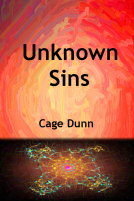
WARNING: This is a rant!
Why this topic? Because I just read (and not for the first time, probably not for the last time) that a person out there (another one) seems to think that if any person says they are a writer, they can’t possibly be a ‘true’ or ‘real’ writer if it (a book/story/novel) can be done in less time than, say, another writer (one they like, and not the other one who pushes out so many they could be termed mercenary).
I realize people have the right to their own opinions, but please, don’t tar that brush on all other people in the same business/profession. We are not all the same!
In a group of five people (writers), there will probably be one or two who plan (but the plans will not necessarily look similar, or even be recognisable as plans), and one or two who will tinker with an outline-y type thing with a few words in a table to show details of character before they go off into the world of creating the story. And one person of the five will dive right in and not consider any type of preliminary structure – let it all hang out!
Does it matter if one, more, or all of these people create and complete their product at the rate of one per year, or ten per year? Does it mean that the ten products is ‘bad’ literary work because of the time worked on only? Is there not a single writer out there who can (and probably does) create multiple works in one year that are quality? There are. I know it and you know it, and I am heartily sick of the people who knock the multiple producers.
We are not all the same. We don’t look the same, talk the same, dress the same, and not all writers work at the same pace.
These are the words that annoyed me:
excerpt (and name removed)
“Know that books of true quality take time to write, just as they take time to truly read and digest and, yes, fully savor. You are not required to pump out a book–or multiple books–each year. Those “writers” (and I use this term loosely) who do so either have a host of hackish Ghost Writers working under them or end up producing poor-quality excuses for literature or, in most cases, both”
The example is only one of many. It’s annoying for many reasons, but the main ones are that WE ARE NOT ALL THE SAME and DON’T TAR ME WITH YOUR BRUSH and more, but . . . I don’t like to start my day angry (unless there’s a spot in the story where it could be useful to wear while I write).
In response: I read (with full comprehension when required) 7-10 books a week. It is possible. It is enjoyable. I don’t sit around all day reading. I read during ad breaks, at night before going to bed, on public transport, while waiting in all the places a person waits – any opportunity to read is used for reading.
I write about 50k words a week. Probably half of this is secondary research notes, but it’s still writing. It’s my job. Every day. Work.
Therefore, based on the squiggly words expressed by these harpies, I must be one of the ‘loosely’ termed writers who produce poor-quality excuses for literature.
Let’s get this straight (for all of you who want to consider that time is the only element of quality) – literature, as a term, is overrated. Most of the works out there don’t fit the term. They were never intended to fit the term. What I do is write stories, that’s all. Stories. I don’t want the people who search for ‘true literary form’ to come to my stories.
And these are my numbers:
I can write 5-10k words per day; at least half is secondary research notes, so let’s say, as a minimum starting point:
2,500 words per day times 350 days (I get sick days, okay) Equals 875,000 words per year. Divide those words by the number of books I want to publish (five, at this stage), so:
875,000 / 5 = 175,000 words.
So, for all you nitty-pickers – WE ARE NOT ALL THE SAME!
Examples (does not include short stories):
Stephen King (60 books approx. but probably more)
versus
George RR Martin (20? approx.).
Please don’t say that Martin is better quality because he takes more time to write a novel; at least, don’t tell Stephen King that or you might end up being one of the character’s in a story that ends up . . . garishly, gruesomely, dead. That’s what I’d do to someone who annoyed me by making silly comments.
Each writer is different, unique, and works alone in their own way.
And the ones who employ ghost-writers as a factory-style business: To them comes the money, the earnings from their business, because on average, a writer (Australian numbers) earns $13k per annum. All that work for such a small return! Don’t you think it might be sensible to create a back-list, get a few novels out there, so you can earn enough to pay your bills? I do. So good luck to all writers; I hope one day you’ll have good earnings from your endeavours.
And now that I’ve warmed up my writing hands, I’m off to work for the rest of the day.


October 4, 2016
The Ceramic Jars
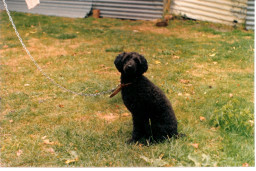
That contain the remains of my animals sit on the shelf, carefully wrapped in tissue paper, never moved or touched until the next jar comes to join them.
A life without one, two, or more of the furry, feathery, leathery or otherwise bedecked, creatures would be a life with something missing. A dog teaches about pack, a cat teaches about confidence, a bird teaches about freedom, a horse teaches about respect, a snake teaches about truth (after all, they are not slimy, don’t attack without cause, and You scare the bleep out of ’em).
And the biggest lesson of all: life ends. We mourn, wallow for a while for what we’ve lost. But to learn the lesson well, we have another thing to learn: to remember how they shared our life, how that being enhanced our moments, brought joy (and other emotions) and  warmth and connection – love and pack.
warmth and connection – love and pack.
The little jars are there because we have been gypsies, moved from place to place, state to state, posting to posting. They come with us, the living and the remembered, because I can’t bear to leave them to the care of someone else. I hold onto them as if they were still in my care and will remain in my care until I take the long-sleep. My will provides for the jars to be sent with me into the flames of renewal. I don’t want to leave them alone, and I don’t want to be without them.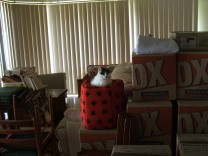
Is this an emotional crux? Do I need to put them in the ground, let them pass on? No. They are already dead, and it’s only me who wants to keep the memory close by. Yes, I remember them, hear the noises they made when they moved in reality through my life, I speak to them (and use them as examples when speaking to the living representatives) and I love them. Always.
It was a lesson to the kids I fostered. Pack is life. Pack is forever. Pack is commitment and continuance. For a dog without pack, life is dangerous and short, and even the lowest ranking pack member expects to be cared for during his life, and mourned when he dies. I do this, I demonstrated this.
There are rules, pack rules, boundary rules, society rules, hunting rules. Everywhere there are rules, but pack is the most important rule of all. No pack means no connection, no love, and no purpose.
Animals teach us many things, and we are still learning – the world is not the same today as it was yesterday. The pack helps us deal with this, and move on, together, in the manner that best befits our purpose.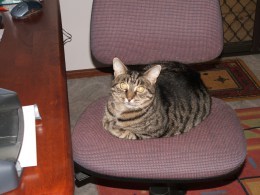
Thank you for listening to my ramble. I love my pack, in all its forms.



